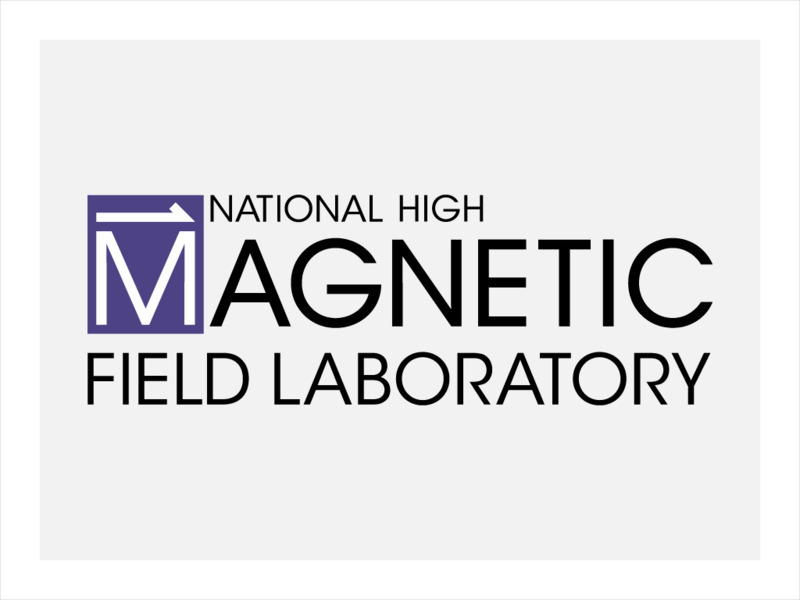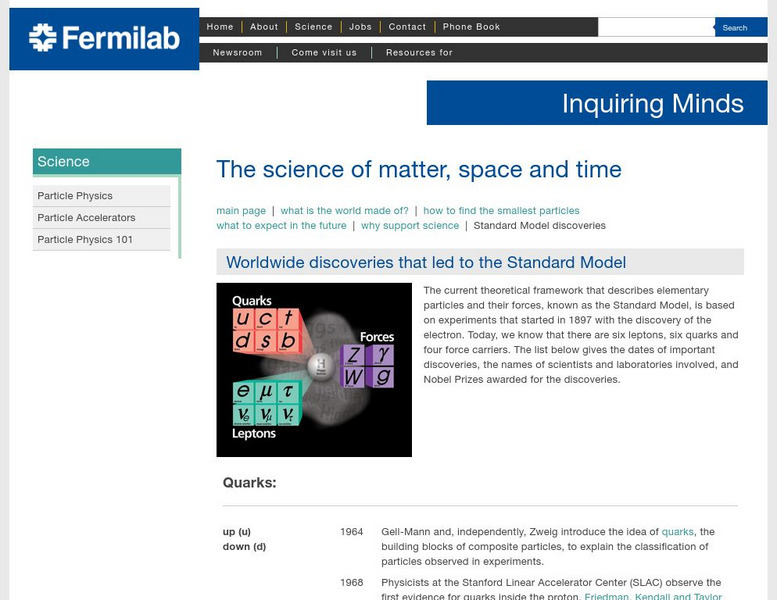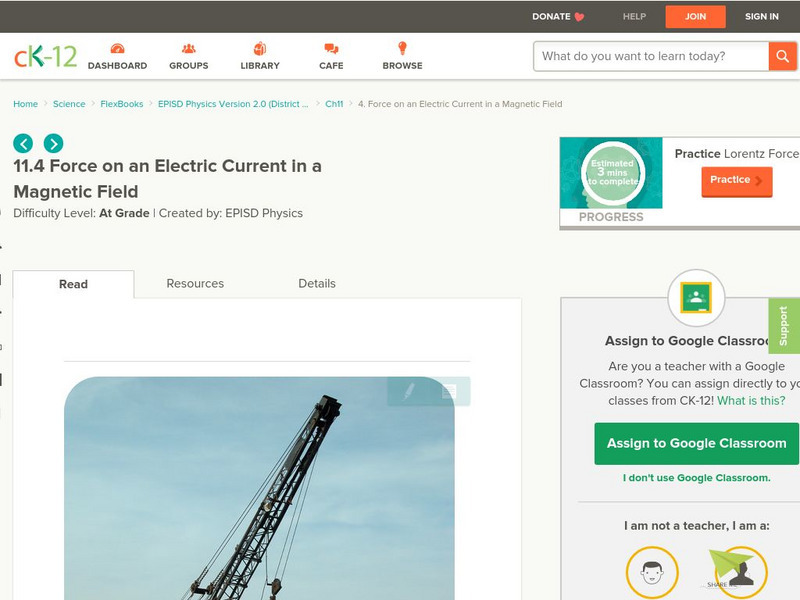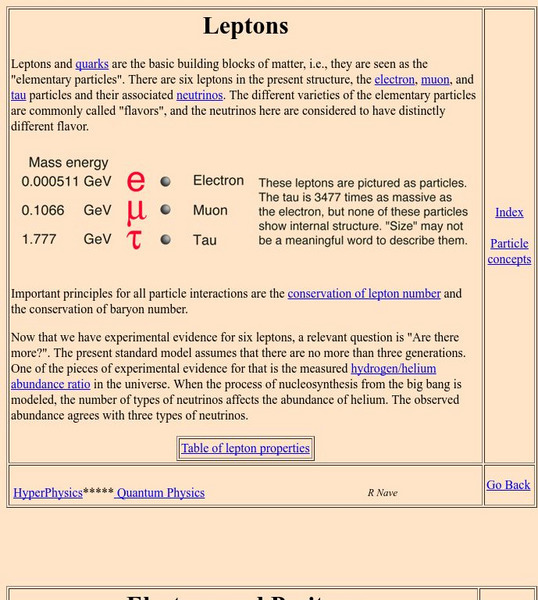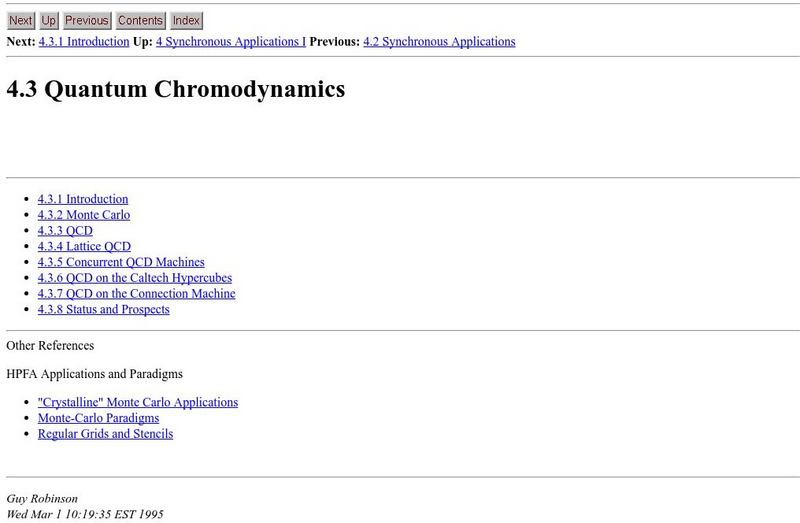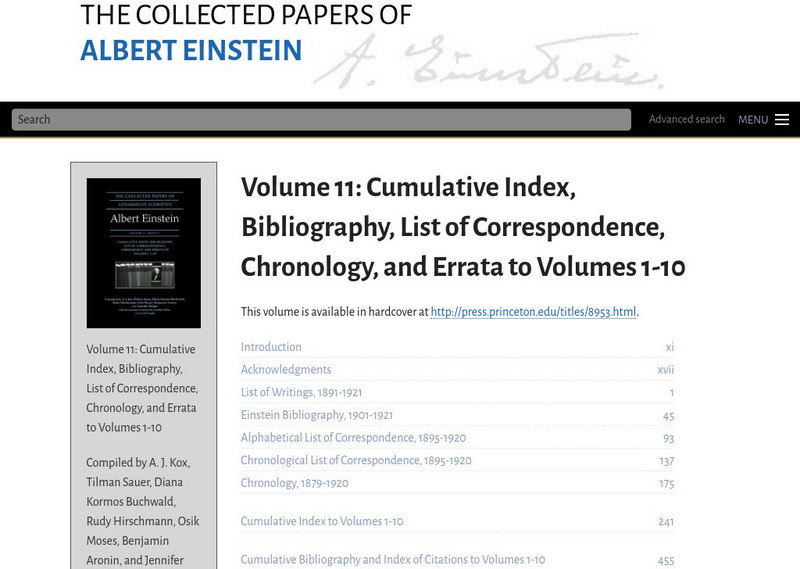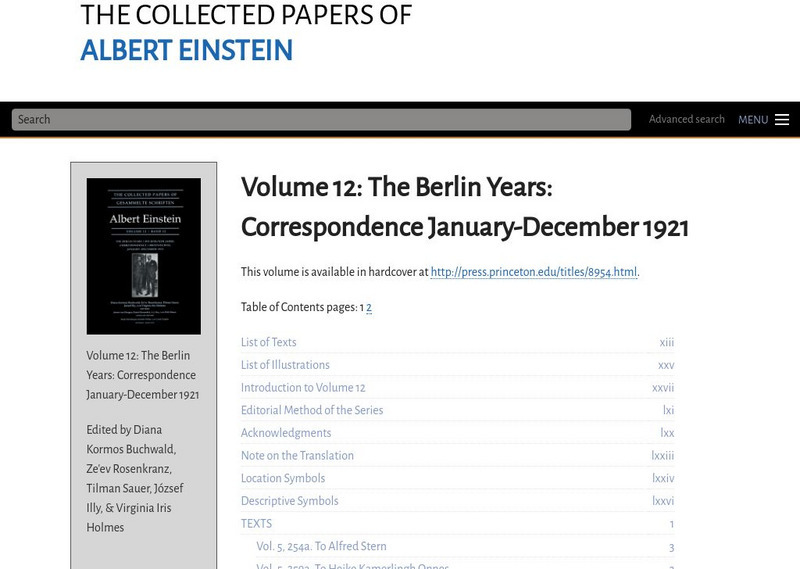National High Magnetic Field Laboratory
Magnet Academy: Richard Feynman
Theoretical physicist Richard Phillips Feynman greatly simplified the way in which the interactions of particles could be described through his introduction of the diagrams that now bear his name (Feynman diagrams) and was a co-recipient...
PBS
Pbs Learning Media: Mystery Mud: Exploring Changes in States of Matter
Join a group of middle-school students on a visit to a laboratory at the Massachusetts Institute of Technology, where they experiment with "mystery mud" and learn about the relationships between magnetism, particle motion, and changes in...
Georgia Department of Education
Ga Virtual Learning: Special Relativity and Quantum Mechanics
In this interactive tutorial students explore special relativity and quantum mechanics. Learn basic tenets of the theory of special relativity and the relationship between mass and energy. Also discover the evidence for the particle...
Texas Education Agency
Texas Gateway: Linear Momentum and Collisions: Conservation of Momentum
By the end of this section, you will be able to describe the law of conservation of linear momentum, derive an expression for the conservation of momentum, explain conservation of momentum with examples, and explain the law of...
Utah Education Network
Uen: All Sorts of Rocks
Second graders will sort rocks according to hardness, texture, layering, and particle size.
Other
Fermilab: Worldwide Discoveries That Led to the Standard Model
A thorough review of subatomic particles and the people that discovered them. Each particle has its own link for additional information.
Exploratorium
Exploratorium: Cern: Linear Accelerator
From CERN, the European Center for Nuclear Research, this site provides a brief description of the physics underlying how a linear accelerator works.
CK-12 Foundation
Ck 12: Radioactivity
[Free Registration/Login may be required to access all resource tools.] This lesson explains the types of radioactive decay and how to write nuclear equations. Includes simulations for learning about alpha and beta particle decay.
CK-12 Foundation
Ck 12: Photoelectric Effect
[Free Registration/Login may be required to access all resource tools.] Students will understand the photoelectric effect and that light has both particle and wave properties. Includes a simulation for exploring the photoelectric effect.
Khan Academy
Khan Academy: Radioactive Decay Types Article
This article from Khan Academy provides information about radioactive decay. This information is intended for the Class 12 Physics Course (India).
CK-12 Foundation
Ck 12: The Nucleus and Isotopes
[Free Registration/Login may be required to access all resource tools.] In this lesson, students learn about the particles in an atomic nucleus, isotopes, and nuclear forces.
CK-12 Foundation
Ck 12: Force on an Electric Current in a Magnetic Field
[Free Registration/Login may be required to access all resource tools.] Students learn how a magnetic field affects moving charged particles or an electric current carried by a wire.
Khan Academy
Khan Academy: Applying Conservation of Charge
A site containing problems using the conservation of charge to practice predicting the results of charge transfer and particle decay processes.
Other
Santa Fe Institute: In Memoriam: Murray Gell Mann
A tribute to the life of Murray Gell-Mann, who passed away on May 24, 2019 at the age of 89. At the end of the article, there are numerous links to other tributes.
Other
Cern: The Compact Muon Solenoid Experiment
The Compact Muon Solenoid Experiment (CMS), an LHC experiment, detects muons, electrons and photons, provides momentum measurements, and, like ATLAS, is responsible for detecting the Higgs boson. This CERN website offers news about CMS,...
Exploratorium
Exploratorium: Cern: Antimatter
A wonderfully written non-technical introduction to antimatter, as well as a brief discussion of the investigation into the asymmetry between the quantities of matter and antimatter observed in our universe.
NASA
Nasa: Reaching for the Stars
Find the latest news on research and development underway to use antimatter as a fuel for space vehicles. (April 12, 1999)
Georgia State University
Georgia State University: Hyper Physics: Leptons
This site has a definition and properties of Leptons, the "Basic building blocks of matter." There are links to table of properties and more information.
Other
Netlib: 4.3 Quantum Chromodynamics
An online textbook containing an introduction to quantum chromodynamics (QCD). This is a proposed theory about what causes quarks and gluons to form hadrons. Article contains a description of lattice QCD, an approximation to QCD that is...
American Association for the Advancement of Science
Fermilab Physicists Find New Matter Antimatter Asymmetry
This complicated yet interesting article describing the discovery of asymmetry between the behavior of matter and antimatter.
Princeton University
Collected Papers of Einstein: Vol 11:cumulative Index, Bibliography for Vol 1 10
A publication of Albert Einstein's written legacy presented in the original language version with in-depth English language annotation readers can access. This volume serves as a cumulative index, bibliography, list of correspondence,...
Princeton University
Collected Papers of Einstein: Vol 12: The Berlin Years: Correspondence 1921 Eng
A publication of Albert Einstein's written legacy presented in the English language translation. This translation volume focuses on his correspondence while iving in Berlin in 1921.
Princeton University
The Collected Papers of Albert Einstein: Volume 1: Early Years, 1879 1902 Eng
A publication of Albert Einstein's written legacy presented in English. This translated volume focuses on his life from birth to early adulthood.
Princeton University
Collected Papers of Einstein: Vol 12: The Berlin Years: Correspondence 1921
A publication of Albert Einstein's written legacy presented in the original language version with in-depth English language annotation readers can access. This volume focuses on his correspondence while living in Berlin in 1921.
